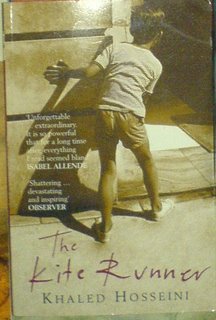 One word that pops up in my mind when I think of "The Kite Runner" is brilliant. Just that - brilliant.
One word that pops up in my mind when I think of "The Kite Runner" is brilliant. Just that - brilliant.It is not often that a book can bring tears to my eyes. Unlike the spoken word or the shown scene, I believe it takes an awful lot of mastery for the written word to move your emotions that much. Khaled Hosseini does just that in "The Kite Runner". The novel is a canvas filled with imagery as varied as anybody's life story is. One thing that struck me about the book was the marked difference in the tone and the circumstances at the beginning of the story and at the end. They are a world apart, not literally though. Before I began to read the book, I knew that it had to do with Afghanistan. With newsreels of the Taliban flashing through my mind, I expected the book to be another graphic description of inhumanity. I was not prepared for the almost serene beginning and the way the book started lead me to assume that the entire book would be a look at an innocent past, now lost. I was wrong again. That is what fascinated me about the book. It was a reminiscence of a past, it was the horror of the past. It contained the truth of the present and the lingering question mark of the later. Everything tied down to the earth and everyday life.
The book takes us to a time and place when Afghanistan was just another country on the planet. A country with its class differences, just like many others. People were very rich or very poor. People were masters or servants. People were privileged Pathans or exploited Hazaras. Amidst the undercurrent of unrest, there was a sort of acceptance and calm. Then the world changed. Atleast Afghanistan did. Change swept past a number of times. Unlike other revolutions where the minorities usually won equal rights, the Afghan Hazaras were exploited even more. The difference in caste was not thrown away even under turmoil. The Kite Runner manages to take us through this roller coaster ride and immerse us in the sadness of it all. It manages to bring to us Afghanistan's modern history in its entirety, all in the span of a few hundred pages. It does this without an elaborate epic. Just a chapter here and a chapter there and yet you are left overwhelmed by the cruelty and the horror we are capable of.
The protagonist is a very normal human being - selfish, self-centered and cowardly. Even when his past stares him in the eye and his guilt tortures his soul, he does not change immediately change. He goes to the extent of becoming angry when he learns some truths that were hidden from him. He questions the sins of his father while conveniently forgetting his own sins. He is not about heroism or courage under fire. He is normal and human. It takes time for him to realise that he is meant to care for someone else. Not a selfless act mind you, but an almost selfish desire to redeem himself of his sins.
A little child is the protagonist's ticket to redemption. A little boy, not even a teenager, whose innocence is raped by a sadist. A sadist, like the rest of the Taliban, who used class and creed as his license to torture and demean a fellow human being. An evil-being that killed people claiming the law of the God, but did not find himself bound by the same law. I cannot do justice to the emotions that rushed through me when I unsuccessfully attempted to imagine how the child might have felt, how it must've hurt him. I cannot describe the honest hurt that the passages about the Taliban brought to me. The what-ifs that crept into my mind are best left undiscovered.
The book left me feeling helpless and praying that we, humans, be saved from ourselves. I am sure you will be, too. An astoundingly fresh first book!
No comments:
Post a Comment